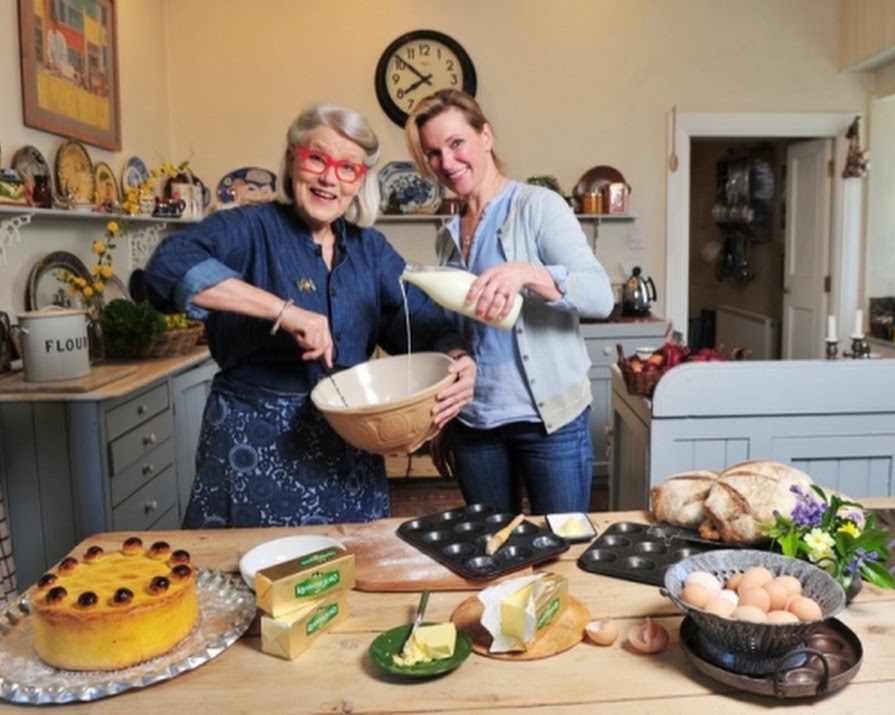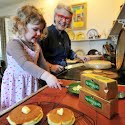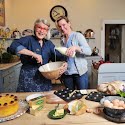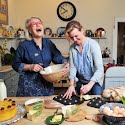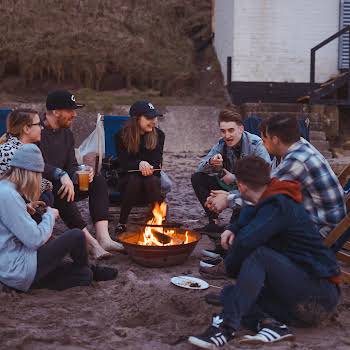By Bill O'Sullivan
06th May 2014
06th May 2014
Rachel and Darina Cooking
Darina Allen is more of an activist than a domestic goddess and we love it.
Darina Allen is the uncontested mother of food in Ireland. For almost 30 years she has energized and solidified the food revolution that has been taking place in this country, turning herself and her Ballymaloe headquarters into an institution and standard-bearer for good Irish food and cooking. In the last few years the food scene has seen an acceleration in its influence as a culture maker. It has ?trendy? elements to it, what with its focus on foraging, DIY culture, and the rise of food photography, but it’s become apparent that naysayers would be wrong to dismiss the country’s newfound interest and dedication to food as a fad. With its focus on green economy, self-sufficiency, a deeper understanding of the food production systems, and on education, food has become the main portal to politics for a generation generally accused of apathy.
Despite being referred to as the Julia Child of the Irish food scene, Darina Allen is far more similar to the new generation of Irish food enthusiasts and chefs – she is outspoken, informed, attuned, and pleasantly unfussy about food. Instagramming your porridge doesn’t bother her in the least – as long as it’s made with quality oats, and good Irish milk. Well-traveled and with a refreshing no-snobbery policy on food, Darina is more likely to want to talk to you about urban farms and how government has failed us, rather than how to achieve the perfect Vicky S. Not that she won’t talk to you about that too though.
You spear-headed some of the movements in the 1980’s that are now hugely influential – the Farmer’s Market movement, slow food movement, food education, foraging. The times have caught up with you. What do you make of it becoming ?hip?? It’s entered into people’s consciousness – food and food issues are something that the media are continually reporting about today. There’s a long way to go, but what you see happening on the Irish food scene now has done much to shake off this image of Irish food that people abroad used to have, where it’s just potatoes, cabbages. It’s a long journey, but the whole artisan food industry here, as spear-headed by people such as Veronica Steele, the matriarch of the Irish Cheese-makers, that’s had a huge impact on changing the image of Irish food abroad. It’s interesting how grassroots movements have been so influential. Now in more recent times, the explosion of craft and microbreweries, really reflect this craving for the hand-made and hand-crafted, something that can be traced back to its origin, that whole thing is gathering momentum. There’s a growing mistrust globally of big food manufacturers, so people are putting their trust more and more in the food production ‘systems.? When they buy something at a farmer’s market they can look the producer in the eye. I think the whole movement has gathered momentum to the point that you could call it a revolution.
You really started the Farmer’s Market movement here in Ireland, and it remains something very close to your heart. How did it come about? I started it almost thirty years ago, after a trip to San Francisco. It was a light-bulb moment. The whole market system had disappeared in Ireland, and I really could see the potential of linking local farmers and producers with local people who were desperate to get local food. At that time supermarkets had gone over to a central distribution system, and local supermarkets that now belonged to a chain, were told not to buy from the local farmers. So produce had to go up to Dublin, to then possibly be brought back down to say Shanagarry, four or five days later. It was hopeless. Anyway, when I was in San Francisco my friend brought me to the farmer’s market which was then in a parking lot (now it’s huge and in Ferry Plaza) and I suddenly thought ?Oh My God, this is the solution!? – not for everybody, but at least for some food producers that could get the full price for their product and stay in business. Of all the things I’m involved in, I think the one I’m most proud of is the restarting of the farmer’s market system. Many people have told me they wouldn’t be on the land anymore if it wasn’t for the markets. People are disenchanted with the robotic, depersonalized way of shopping.
You say ?it’s not for everyone? in terms of producers, but in the sense of consumers too? We’re all living different ways, but the percentage of people who are aware and making the connection between the quality of the food they’re eating, and their healthy, energy and vitality, that’s really growing. The food crises are just going to keep on coming, and they sharpen people’s focus on the way their food is produced – the breeds, the feeds. The whole interest in growing your own food has just sky-rocketed. Almost 20 years ago I was advocating growing your vegetables in your garden, and a farmer came over to me and said ?Darina, don’t you realise, the neighbours would think you couldn’t afford to buy your own vegetables.? Now it’s come to the point where it’s everywhere – sort of like foraging, there’s some serious one-up-manship going on almost! This isn’t particularly politically correct, but we have to accept that food is simply being sold too cheap. We’ve come to the point where farmers and food producers are not being paid enough to produce quality food. People complain about the price of quality food. You see, people who grow something themselves would never dream of complaining about the price of produce, it’s people who would never dream of picking up a spade that do. Everybody, no matter what their income is, deserves to get food that is nourishing. For instance, if I were Food Minister I would ban Slice Pan. But then again, there’s an example – when bread started getting really bad, we saw the emergence of all these little artisan bakeries. Same with beer and cider, and the emergence of microbreweries. So human nature is wonderful – when you think all is lost you have these mavericks and sometimes deeply eccentric people who just say no!
You’re quite vocal and active in terms of politics and food. How do you feel about the DIY culture that exists around food now, such as urban farming for instance? I was an activist and to some level still am, and there is a great grassroots movement going at the moment. People are forgetting about government and doing it themselves – cities feeding themselves again, it’s wonderful. When I travel I visit urban farms all the time. I also really find it important to visit school gardens – we absolutely must teach children how to cook and how to grow, and the Irish political system is failing us in the way they’re approaching this. And it’s not just Ireland. It’s vital that these two life skills be embedded in our education.
You said earlier that good food should be available to all regardless of income, and you’re very committed to education around food. But arguably both culturally and financially the type of food we’re speaking of is not available to everyone today. The affordability of this food is a real problem. How do you bridge the gap between the food revolution that’s taking place, and the normal people who it might not be reaching? The whole system is fractured in this case. Many people on the lowest income can’t get their hands on good food. For two generations their parents won’t have cooked, and that’s across the board regardless of income. So from a very early age we have to give children a proper education in food – children are so enthusiastic, they’re like sponges, they take in everything – so the earlier you get them, the better it is. Secondary school is too late, food habits are learnt before children even go to school. We need to do this til it becomes the norm – now it’s still preachy preachy. They need to implement gardening and proper kitchens in schools – people can grow things in tomato cans or cut-off milk bottles. It’s a whole different mind-set we need and it’s beyond urgent at the moment. But people I think are taking this matter into their own hands – forget the government – there’s a lot of community schemes that need someone to bring all of them together, and stop them being so disjointed. It’s urgent – the wealth of a nation depends on the health of a nation.
On a different note – What did you think when you first met Rachel?Ha! Well she came to do one of our cooking courses, and she was part of a great group, I didn’t particularly notice her at the beginning. She was a real party girl, a real butterfly – I’m not saying anything to you that I haven’t said to her. Then she started going out with Isaac, so we got to know her better. When the course was over, she decided she actually wanted to become a cook and stayed in the Ballymaloe kitchens – it became clear she was really talented, a very good communicator and a real personality.
What restaurants in Ireland do you go to? Oh this is always a tricky one. Funnily, I had a really good lunch in The Fumbally a couple of weeks ago, I love the whole style of The Fumbally. I generally like neighbourhood restaurants and am not as drawn to Michelin starred restaurants. I like places that are serving local food according to the seasons to locals around them. But having said that there are amazing places now in Dublin – The Greenhouse, Chapter One, Ananda are all excellent. Island Cottage on Hare Island would be one of my favourite places.
You’re working on a family recipe project with Kerrygold, what’s it about? We’re looking for something comforting, nourishing, delicious – the everyday food we like to eat at home. It’s about good produce, including butter. And Kerrygold are sponsoring the Ballymaloe Literary Festival this year which we’re really delighted with. Ever since I came onto the public consciousness 30 years ago, we’ve always used butter – never margarine or low-fat alternatives. I was passionately interested in healthy, nutritious food, so I always used butter. Low-fat is one of the greatest cons of the century – less flavour, less nutrients – it’s cheap food really. All the information we got about fat over the past four decades was the wrong advice. When I did Simply Delicious on TV I used to get a lot of letters of complaint about using butter, and promoting food that was unhealthy. And I always defended butter, always believed in it, as the natural and healthy option, and did so because it was what I was about – this is the first connection we’ve ever had with Kerrygold, we’ve always been independent, but we’re very pleased and proud to be connected with Kerrygold because of this.
To enter the Kerrygold Family Recipe Competition go here
Roisin Agnew @Roxeenna











